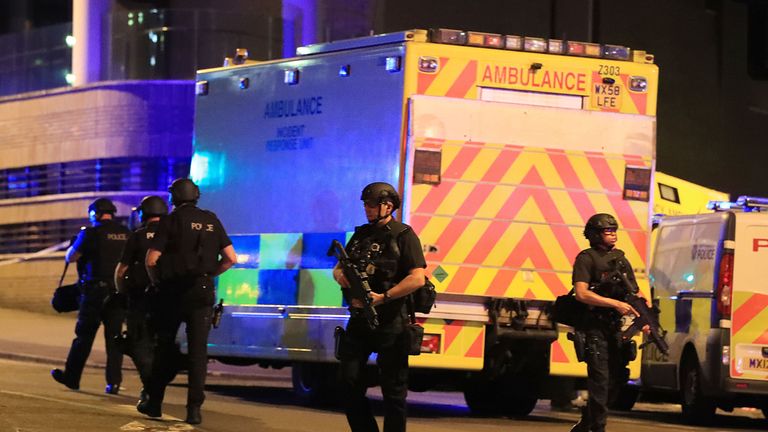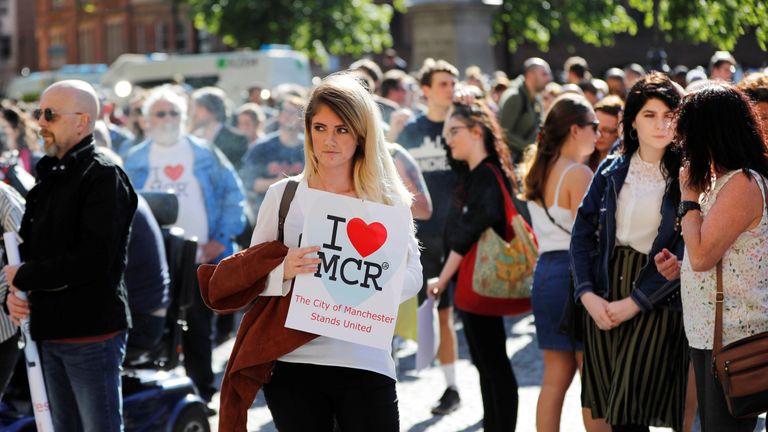Manchester Arena bombing: Police control room staff 'not trained to handle terror attack', inquiry told
A lack of preparation had been highlighted six months before the attack, an inspector says, calling it "much less than ideal".
Monday 8 February 2021 23:49, UK
Greater Manchester Police had not trained their control room staff in how to cope with a terrorist attack before the bombing of the arena, the inquiry has heard.
Police failed to keep in touch with the other emergency services, leaving 40 minutes with only one paramedic and a gap of two hours before the fire service turned up.
Andrew Buchan, a former senior manager for HM Inspectorate of Constabulary (HMIC), told the inquiry that problems had been spotted by his staff six months before the attack and the situation was "very much less than ideal".
The inspectorate had come in to specifically look at counter-terrorism measures in November 2016 and had given an assistant chief constable a "hot debrief" before writing their report.
The report found there was a risk of the force duty officer (FDO) becoming "overloaded" with tasks to perform but also found that Manchester had not trained staff to help out.
"We believed that that's a gap in their ability to manage the incident under a huge pressure, certainly in those first few moments. This, we believed, was a gap in their abilities," he told the inquiry.
Paul Greaney QC for the inquiry asked if the force duty officer was capable of becoming overburdened in the event of Operation Plato, a marauding terrorist firearms attack, being declared and staff "would not necessarily know what was expected of them" it "might be thought to be a state of affairs that was somewhat less than ideal?"
"Yes, very much less than ideal," Mr Buchan said.
The inquiry was told that the inspectors spoke to a chief superintendent who was head of the operational communications branch.
He told them the "silver" control room arrangements had been tested during an exercise called Winchester Accord at the Trafford Shopping Centre in May 2016.
The exercise concluded that the FDO had become overwhelmed and he had failed to communicate with the fire service who turned up two hours later, just as they did on the night of the attack in May 2017.
However, the inspectors found the chief superintendent was "unaware of any lessons learned from previous operations or exercises filtering through to control room staff".
Nevertheless, the chief superintendent did identify a lack of training for control room staff on how best to respond to a terrorist attack.
A focus group of eight workers from the control room revealed that none of the group had received any training relevant to their role in a terrorist attack.
Sir John Saunders, the chairman, asked: "When you are talking about having other people to help the FDO, these are the people who would be doing that and they'd had had no training?"
Mr Buchan told the inquiry they would be manning screens, telephones and helping run the day−to−day business of the force, adding: "That is where the support would come from for the FDO."
"And they'd received no training?" Sir John asked.
"They told us they had received none," Mr Buchan said.
"Had any of the group participated in any counter-terrorism exercising?" Mr Greaney asked.
"Some had participated in some CT exercises. Winchester Accord, was how they would work in the silver suite, supporting the silver commander, which to them didn't reflect or didn't read across well to their day−to−day role," Mr Buchan told the inquiry.
"Did they tell you about feedback that they'd had?" Mr Greaney asked.
"They'd had no formal feedback," the inspector said.
Mr Greaney asked: "What would happen in the event of Operation Plato being declared, what would staff have to do in order to be allocated a task?
"They would have to access the documentation that would tell them what needed to be done and then between themselves organise that work, and when we pressed them they said they'd ask the FDO what to do," Mr Buchan said.
"So this is the FDO who is under or capable of coming under extreme pressure, the other staff felt that they would have to speak to that person to see what job was expected of them?"
"That's correct," the inspector said.
The inspectors also spoke to officers on the beat and found that none were aware of the plans Greater Manchester Police (GMP) had in place to respond to a terrorist attack.
"Was it the position that the focus group identified that no training had been given to unarmed staff beyond some online training and that those interviewed felt that that was inadequate?" Mr Greaney asked.
"That's right, yes," Mr Buchan said.
"And no member of that focus group had participated in a counter−terrorism exercise?"
"That's correct," he added.
"Like other forces, we believed that GMP needed to do more to prepare staff who are undoubtedly going to be the initial officers at the scene of a terrorist attack to work effectively and make the best job they possibly can in very trying circumstances."
A third group also felt underprepared, known as duty inspectors, who would have to command the unarmed response on the ground.
None had received any counter-terrorism training and none had received feedback from counter-terrorism exercises.
"All felt ill−prepared to deal with that situation," Mr Buchan said.
"One of the group underlined this general view, saying that in this particular case specific training could actually save lives."
Mr Greaney asked: "The point that was being made that they were the most likely to be the first responders to a terrorist attack and such training therefore could literally save lives?"
"Exactly," said Mr Buchan.
"That was the view that was expressed within the focus group, did the Inspectorate agree?" Mr Greaney asked.
"We agreed," the inspector said.
The inspection, which was too sensitive to be published, found that "more needed to be done by GMP to address some of the challenges that a terrorist attack would present, particularly in preparing its control room staff and unarmed initial responders".
The inquiry continues.








